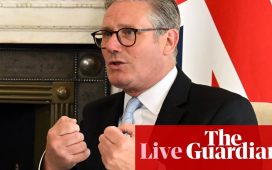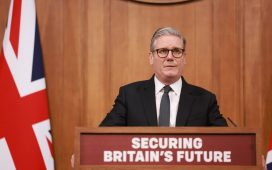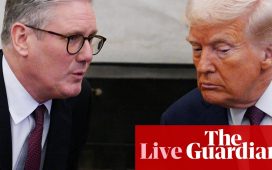Kemi Badenoch claims it’s ‘harmful’ to tell children they can be born in wrong body after rightwingers attack trans guidance
The long-awaited publication yesterday of the government’s transgender guidance for schools in England was seen as a setback for Kemi Badenoch, who is minister for women and equalities as well as business secretary. She had reportedly been pushing from something much closer to a ban on social transitioning. But this would required a change to equality law, and the final proposals seemed more in line with the thinking of Gillian Keegan, the more liberal education secretary.
Badenoch has responded by writing an article on the subject for the Daily Mail. Ostensibly she is defending the guidance, but in her article she goes beyond what it actually says, arguing that it is “harmful” for teachers to say that people can be born in the wrong body. She also questions whether it is even righ to talk about trans children. She says:
Teaching children that you can be born in the ‘wrong’ body is harmful. Teachers and carers should be reminded that just because a child does not conform to stereotypes associated with being a girl or a boy, that does not mean they should be put on a path to medical or social transition. While legislation exists that allows adults to go through a process to change their legal sex, children’s legal sex is always the same as their biological sex.
So, we should be wary of those who speak casually about ‘trans children’.
While the article reflects Badenoch’s views, her decision to publish it may also be linked to her desire to neutralise criticism of the guidance (jointly signed off by Badenoch and Keegan) from rightwing Tories. Yesterday Liz Truss, the former PM, said it did not do enough to protect children. And Suella Braverman, the former home secretary, said social transitioning in schools should be banned. She posted these messages on X.
First, it is concerning that the guidance still enables social transitioning to take place in schools. No child is born in the wrong body and gender ideology should have no place in schools.
This serious weakness needs to be addressed so that there is no room for doubt. 4/7
— Suella Braverman MP (@SuellaBraverman) December 19, 2023
First, it is concerning that the guidance still enables social transitioning to take place in schools. No child is born in the wrong body and gender ideology should have no place in schools.
This serious weakness needs to be addressed so that there is no room for doubt.
Second, it is disappointing that schools will still be obliged to address gender-questioning children by their preferred pronouns in some circumstances. This should be totally prohibited.
Lastly and more generally, too much discretion is left to individual schools and teachers. Given the many exceptions and caveats throughout, the guidance is open to many different interpretations and loopholes will be easily exploited.
Badenoch and Braverman are expected to be the two leading candidates from the right in the next Conservative party leadership contest.
My colleague Archie Bland has a good analysis what the guidance, which you can read here.
Key events
Michelle Mone facing legal action over costs incurred as result of ‘mendacious’ libel threats to reporters
Michelle Mone is facing legal action after her admission that she lied to the media over her links to a PPE firm that won controversial government contracts during Covid.
The businesswoman and peer told the BBC at the weekend that she repeatedly denied being connected to PPE Medpro because she wanted to protect her family from press attention and she declared: “That’s not a crime.”
But several news organisations incurred costs of their own responding to the letters from lawyers acting on behalf of Mone who were threatening libel action and one of them, the New European, has said it will go to court next year to try to recover the money it was obliged to spend as a consequence of her lies.
Matt Kelly, the paper’s editor-in-chief, said:
We were forced to spend several thousand pounds of costs in legal fees responding to her mendacious threats. We want our money back.
More than that, we want to establish a future deterrent against wealthy individuals willing to lie to stymie honest reporting. We look forward to seeing Mone in court in the new year.
Kelly, who has instructed solicitors and counsel and expects the case against Mone to start early next year, is working on the case with the Good Law Project, a campaigning group using litigation to enforce good governance standards.
Jolyon Maugham KC, the Good Law Project’s founder, said:
The law must not allow itself to become a tool whereby those with money can bully and silence those with none. We aim to create further jeopardy for those who engage in these kinds of egregious breaches.
Mone is also being investigated by the National Crime Agency over allegations relating to the Covid contracts awarded to PPE Medpro. She has repeatedly denied wrongdoing, and in her BBC interview claimed that she was being treated as a scapegoat.
Labour launches byelection campaign in Wellingborough, saying ‘it’s time for change’
Labour is not wasting any time getting its campaign off the ground in Wellingborough, where a recall byelection will take place after it was announced last night that more than 10% of voters in the constituency signed the petition calling for one. Jonathan Ashworth, a shadow Cabinet Office minister, has been in the constituency today with the party’s candidate, Gen (short for Genevieve) Kitchen.
Ashworth said:
I think it’s clear that people across Wellingborough, they want a fresh start. They know it’s time for a change.
And after 13 years, now going on 14 years, of the Conservatives, when people are paying more in tax, they’re paying more on their mortgage thanks to decisions by the Conservative government, they are paying more on their energy bills, they’re paying more in the shops, families are struggling and they know that there can be a better way.
They want a government that is on their side and they want an MP who is on their side. So I think it’s clear now that the country wants change. And here in Wellingborough, it’s Labour offering that change.

Peter Bone had a majority of 18,540 when he was elected for the Conservatives and in normal circumstances Wellingborough would be seen as a safe Tory seat. Labour has not won an election there since 2001.
As Sunder Katwala, head of the British Futures thinktank points out, Labour has only overturned a majority that large in a byelection three times in its history. But all three of those byelections took place within the last year, and so it is not unreasonable to assume Labour can pull off another win on that scale.
There is also some polling suggestion that Labour should be able to win. This is from the polling firm Savanta, which says that its recent MRP model suggested Wellingborough would go Labour at the next election. (MRP, multilevel regression and post-stratification, is a form of polling that takes national voting intention data and tries to work out what would happen constituency by constituency, using demographic breakdowns.)
ICYMI the first time:
Our September MRP model implied that Peter Bone’s seat of Wellingborough would switch to Labour at a General Election.
🌳CON 35% (-27)
🌹LAB 47% (+21)
🔶LD 7% (-1)
➡️Reform UK 7% (new)
⬜️Other 5% (-1)7,409 GB adults, 22-25 September 2023 pic.twitter.com/SNHMax0fvK
— Savanta UK (@Savanta_UK) December 20, 2023
And Britain Elects says the New Statesman’s Britain Predicts model also has Wellingborough going Labour.
In an attempt to bring down expectations, Labour Together, a party thinktank, has pointed out that even a narrow win would be disastrous for Rishi Sunak. Josh Williams, its director of strategy, said:
Wellingborough has a Tory majority of over 18,000 and overwhelmingly voted for Brexit. If Labour can win in Wellingborough it will be a remarkable victory.
But this is a big ‘if’. The 18% swing Labour would need is more than current national polling. Labour has overturned some enormous majorities of late.
Even a sizeable swing towards Labour that ends in the Tories scraping through will be yet more evidence that the country is ready for a change.

Mark Drakeford claims voters will say Tory management of economy to blame for Welsh government’s budget cuts
Mark Drakeford, the Welsh first minister, has said that voters in Wales will conclude that the government in Cardiff is only having to impose budget cuts because of the way the Conservative government at Westminster has managed the economy.
In an interview with PA Media, Drakeford, who is standing down as first minister early next year, said he was “optimistic” for Labour’s prospects in Wales at the general election
Asked how the draft budget might affect his party’s electoral position, he said:
I think people in Wales will be understanding of the context within which the budget is set.
We have had to find £1.3bn in our budget compared to the budget that was set for us by the Tories. That is the point I think we keep trying to explain to people.
When Rishi Sunak was chancellor of the exchequer, he set a budget for us in the comprehensive spending review. The budget that he said we needed is worth £1.3bn less than when he set it.
The struggle that we face is a direct result in the way in which the Tories have managed the economy and the impact of inflation and so on, so I think in Wales there is a broad understanding of where the responsibility for all this lies.
Drakeford also said that, after stepping down, he would not accept a seat in the House of Lords as an unelected peer. He said:
I will not be looking to, if I were ever to be asked, I would not be looking to become a member of an unelected House of Lords. I simply don’t believe that that is the right way to run things in a democracy.

Kemi Badenoch claims it’s ‘harmful’ to tell children they can be born in wrong body after rightwingers attack trans guidance
The long-awaited publication yesterday of the government’s transgender guidance for schools in England was seen as a setback for Kemi Badenoch, who is minister for women and equalities as well as business secretary. She had reportedly been pushing from something much closer to a ban on social transitioning. But this would required a change to equality law, and the final proposals seemed more in line with the thinking of Gillian Keegan, the more liberal education secretary.
Badenoch has responded by writing an article on the subject for the Daily Mail. Ostensibly she is defending the guidance, but in her article she goes beyond what it actually says, arguing that it is “harmful” for teachers to say that people can be born in the wrong body. She also questions whether it is even righ to talk about trans children. She says:
Teaching children that you can be born in the ‘wrong’ body is harmful. Teachers and carers should be reminded that just because a child does not conform to stereotypes associated with being a girl or a boy, that does not mean they should be put on a path to medical or social transition. While legislation exists that allows adults to go through a process to change their legal sex, children’s legal sex is always the same as their biological sex.
So, we should be wary of those who speak casually about ‘trans children’.
While the article reflects Badenoch’s views, her decision to publish it may also be linked to her desire to neutralise criticism of the guidance (jointly signed off by Badenoch and Keegan) from rightwing Tories. Yesterday Liz Truss, the former PM, said it did not do enough to protect children. And Suella Braverman, the former home secretary, said social transitioning in schools should be banned. She posted these messages on X.
First, it is concerning that the guidance still enables social transitioning to take place in schools. No child is born in the wrong body and gender ideology should have no place in schools.
This serious weakness needs to be addressed so that there is no room for doubt. 4/7
— Suella Braverman MP (@SuellaBraverman) December 19, 2023
First, it is concerning that the guidance still enables social transitioning to take place in schools. No child is born in the wrong body and gender ideology should have no place in schools.
This serious weakness needs to be addressed so that there is no room for doubt.
Second, it is disappointing that schools will still be obliged to address gender-questioning children by their preferred pronouns in some circumstances. This should be totally prohibited.
Lastly and more generally, too much discretion is left to individual schools and teachers. Given the many exceptions and caveats throughout, the guidance is open to many different interpretations and loopholes will be easily exploited.
Badenoch and Braverman are expected to be the two leading candidates from the right in the next Conservative party leadership contest.
My colleague Archie Bland has a good analysis what the guidance, which you can read here.
Junior doctors say their pay is ‘just not enough’ as three-day strike in England starts
Junior doctors “do not earn enough”, medics have said as they launched a fresh round of strike action in the bitter dispute over pay with the government, PA Media reports. PA says:
Medics described how their colleagues are “fleeing the country” and how “there won’t be any doctors left” unless pay is improved.
Doctors in training from the British Medical Association (BMA) and the Hospital Consultants and Specialists Association in England began a 72-hour strike at 7am on 20 December.
Speaking on a picket line at University College Hospital in London, Dr Hamish Bain said junior doctors were leaving the NHS over the “correctible issue” of pay.
The 30-year-old told the PA: “Every year there’s a pay review body that suggests increasing pay, and that increase in pay hasn’t reflected inflation and the cost of living – so in real terms our pay has been cut.
“I obviously appreciate that people are upset about missing elective appointments and outpatient appointments, but if we don’t act now then five or 10 years down the line there won’t be any doctors left and those appointments will become much worse and much longer than they are.”
Dr Vivek Trivedi, co-chair of the BMA junior doctors’ committee, said that in order to break the deadlock the government needed to “recognise and value doctors and not inflict a real-terms pay cut”.
“What that will look like is a credible offer that can stop strikes now and forever in the future,” he told PA.
“We were in talks for the best part of a month or so and thought we were making good headway there but unfortunately by the deadline that both sides had agreed to, what they had on the table was never going to have been good enough for our members.”
Asked whether he believed that junior doctors had the support of the public for the strikes, he said: “I think the public know the only way to have a healthcare system that looks after them is to have enough doctors. And they can completely appreciate when doctors graduate and they’re starting on £15.50 an hour – after the government’s latest pay uplift – and go to a maximum of £30 an hour after 10 years of working, that’s just not enough.”
He said that the offer from the government, an average 3% rise, would see doctors who are paid £15.50 per hour given a rise to be paid £16 per hour.
Trivedi said that it was “not unreasonable” for doctors to want to be paid £21 per hour.

Treasury considered distributing pre-paid debit cards, or vouchers, to stimulate economy during Covid, inquiry told
Back to the Covid evidence and, as Chris Smyth reports in the Times, a Treasury official has revealed that, as the government considered ways of boosting the economy in the summer of 2020, it considered issuing people with pre-paid debit cards.
Dan York-Smith, who is now the Treasury’s director general for tax and welfare and who was head of the strategy, planning and budget group during Covid, discusses the plan in his witness statement. Another proposals that was considered was to distribute vouchers for use in some retail sectors.
But both proposals were ruled out, and instead the Treasury opted for the “eat out to help out” (EOTHO) restaurant subsidy scheme. York-Smith says:
The first option, namely the distribution of pre-paid debit cards, presented substantial challenges and risks. For example, registering every adult in the UK would have presented very significant challenges in the time available. Even if that could be achieved, there would have been significant risks associated with tens of millions of cards being distributed through the post as part of a highly publicised and marketed scheme, such as theft, fraud and loss. That was a risk that also attached to sending out vouchers by post. A substantial customer support function would also have been required, which did not exist. The compressed timetable of the scheme increased the significance of these challenges.
York-Smith confirms that there was “no specific risk assessment of how the EOTHO scheme might impact on Covid-19 transmission” but he says the Treasury went ahead with the plan “in the context of extensive cross-government decisions on the safe lifting of NPIs [non-pharmaceutical interventions]”.
Laurence Fox, the leader of the Reclaim party, has issued a statement about the resignation of his party’s one MP, Andrew Bridgen. He says he accepts Bridgen’s need to focus on issues that matter to his constituents, hopes Bridgen gets re-elected, and is donating to his campaign fund.
Fox said:
It has been a pleasure working with Andrew. He is a man of great bravery and we remain hugely supportive of his campaigning on a number of issues. He rightly sees his role to raise issues of concern to his constituents. There are too few in parliament prepared to do that.
He has been an excellent constituency MP and we wish him every success in his bid for re-election in North West Leicestershire. As a reflection of that support, we have made a considerable donation to Andrew’s campaign fund.
Mel Stride, the work and pensions secretary, was doing interviews on behalf of the government this morning. He described the three-day strike by junior doctors in England starting today as “deeply regrettable”. He said:
I think it’s just deeply regrettable that at this particular time, when the NHS will be under additional pressure over Christmas and the new year and with the colder weather, the doctors have walked away from the negotiations.
Stride said the junior doctors’ demand for a 35% pay rise was unrealistic, and that they were now an outlier because most other groups in the public sector had reached pay settlements.

Andrew Bridgen MP quits Reclaim party citing ‘difference of direction’
One reason why small parties flounder in the UK is that they tend to be dominated by a tiny number of egotistical people who can’t get on. The Reclaim party essentially was Laurence Fox (an actor turned rightwing provocateur) until it attracted its first MP when Andrew Bridgen joined it in May. Bridgen had been elected as a Conservative, but had been expelled from the party earlier in the year for comparing the use of Covid vaccines to the Holocaust.
Now they’ve split. In a statement posted on X, Bridgen says he has resigned from the party because of a “difference of direction”. He wants to focus on his anti-vaccine campaigning.
Bridgen said:
This morning, I have made the incredibly difficult decision to resign from the Reclaim party. I would first of all like to thank Laurence and all of the team at Reclaim who have been excellent and supported me wholeheartedly for the last nine months.
I have come to this decision purely because of a difference in the direction of the party, I will still wholeheartedly support the policies and values of the Reclaim party and wish them all of the best in their future endeavours.
However, I need to make a very important decision with a general election pending in the first half of next year. I need to put North West Leicestershire first, above any party allegiance. I will continue standing up and fighting for the people of North West Leicestershire and delivering what is best for them.
I have consistently campaigned against HS2 since my first election in 2010, I have been at the forefront of exposing scandals such as the modern day slavery cover-up in Leicester and the Post Office Horizon scandal which was debated in the House of Commons yesterday.
I have been standing up for those who have been injured by vaccines and exposing the worrying cover up of trends in excess deaths on a national and indeed global scale.
A statement by Andrew Bridgen MP:
“This morning, I have made the incredibly difficult decision to resign from the Reclaim Party.
I would first of all like to thank Laurence and all of the team at Reclaim who have been excellent and supported me wholeheartedly for the last 9…
— Andrew Bridgen MP (@ABridgen) December 20, 2023
Former education secretary Gavin Williamson criticises Boris Johnson’s ‘panic’ Covid school closures in 2021
Good morning. Over the last two days the Covid inquiry has published hundreds of new pieces of evidence on its website. It is going to take journalists a while to go through them properly, and on Monday and Tuesday they did not receive much coverage, but with the Commons now in recess, and other political news starting to dry up, there is more time to take a look.
The best story to emerge so far comes from Penny Mordaunt’s witness statement. Mordaunt, who is now leader of the Commons, describes in some detail how a series of WhatsApp messages with Boris Johnson mysteriously disappeared from her phone, and that Johnson’s then chief of staff ignored 14 attempts by her to arrange a meeting to discuss the matter. Peter Walker has the story here.
Johnson told the inquiry earlier this month that he did not know why thousands of his WhatsApp messages had gone missing, but that he had not removed them himself. Mordaunt’s story will heighten suspicions that his account is not entirely accurate.
Gavin Williamson, who was education secretary, is another MP who provided a witness statement for module two of the inquiry, looking at governance, but who did not give evidence in person. His statement has now been published, and in it he criticises Johnson for making a “panic decision” to close schools in January 2021. He says:
On the decision to close schools in January 2021, my advice was initially taken into account by the PM during December 2020. On this basis, I was able to work up detailed plans with [Matt Hancock, the health secretary] on the return to school plans, with headteachers and DfE officials working all through the Christmas period to make this happen. Ultimately though, on the final decision to close schools on 4 January 2021, 1 consider that the PM did not give my advice sufficient weight or sufficiently take children’s interests into account.
I considered this decision to be wrong on two grounds. Firstly, we had seen the impact, especially on the most disadvantaged children, of not having schools open and operating as normally as possible. My concern was that a second set of restrictions would set back children’s educational recovery and progress even further. Secondly, I felt it was wholly unnecessary. We had seen exceptionally high rates of Covid-19 in a number of northern towns and cities, yet had been able to keep schools open in these areas over this period. While this would be exceptionally challenging at a national level, I felt it was the right thing to do, as keeping children in school was so beneficial to them. I still believe that the decision did not sufficiently take children’s interests or wellbeing into account. I believe that the decision to close schools in January 2021 was not required. It was a panic decision, made without having children’s interests front and centre.
I will post more from the Covid documents during the day.
Otherwise, there is not much happening at Westminster, but junior doctors are on strike in England, the Scottish parliament is sitting, and there has been good news for the government on inflation, which Julia Kollewe is covering on her business live blog.
If you want to contact me, do try the “send us a message” feature. You’ll see it just below the byline – on the left of the screen, if you are reading on a laptop or a desktop. This is for people who want to message me directly. I find it very useful when people message to point out errors (even typos – no mistake is too small to correct). Often I find your questions very interesting, too. I can’t promise to reply to them all, but I will try to reply to as many as I can, either in the comments below the line; privately (if you leave an email address and that seems more appropriate); or in the main blog, if I think it is a topic of wide interest.










